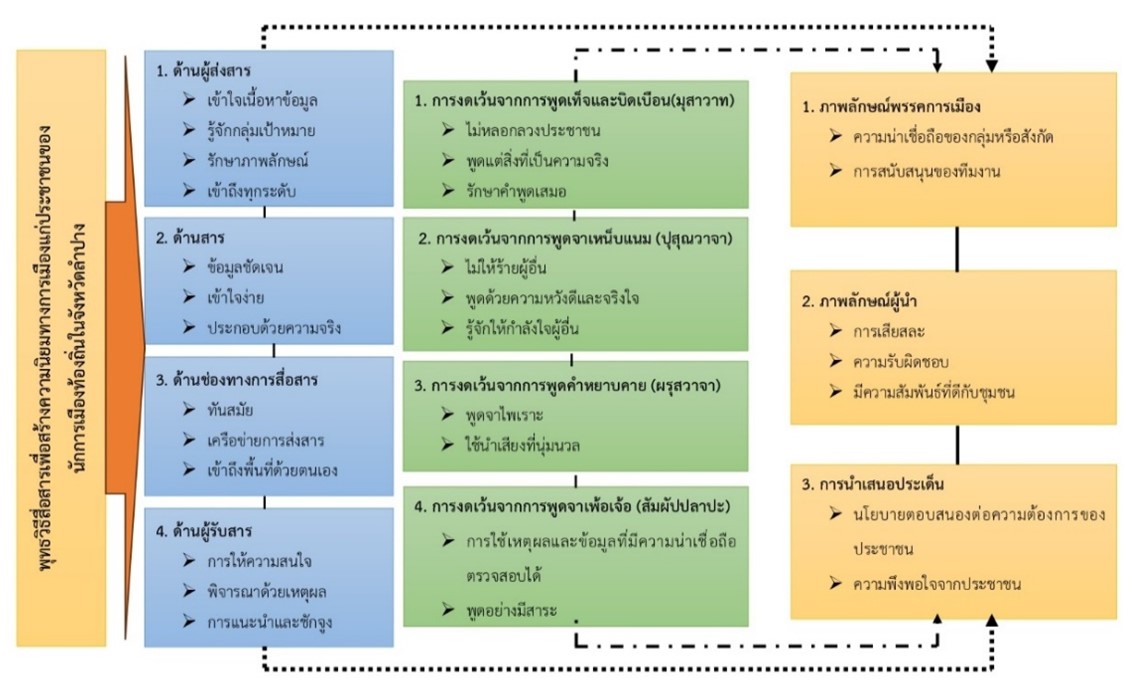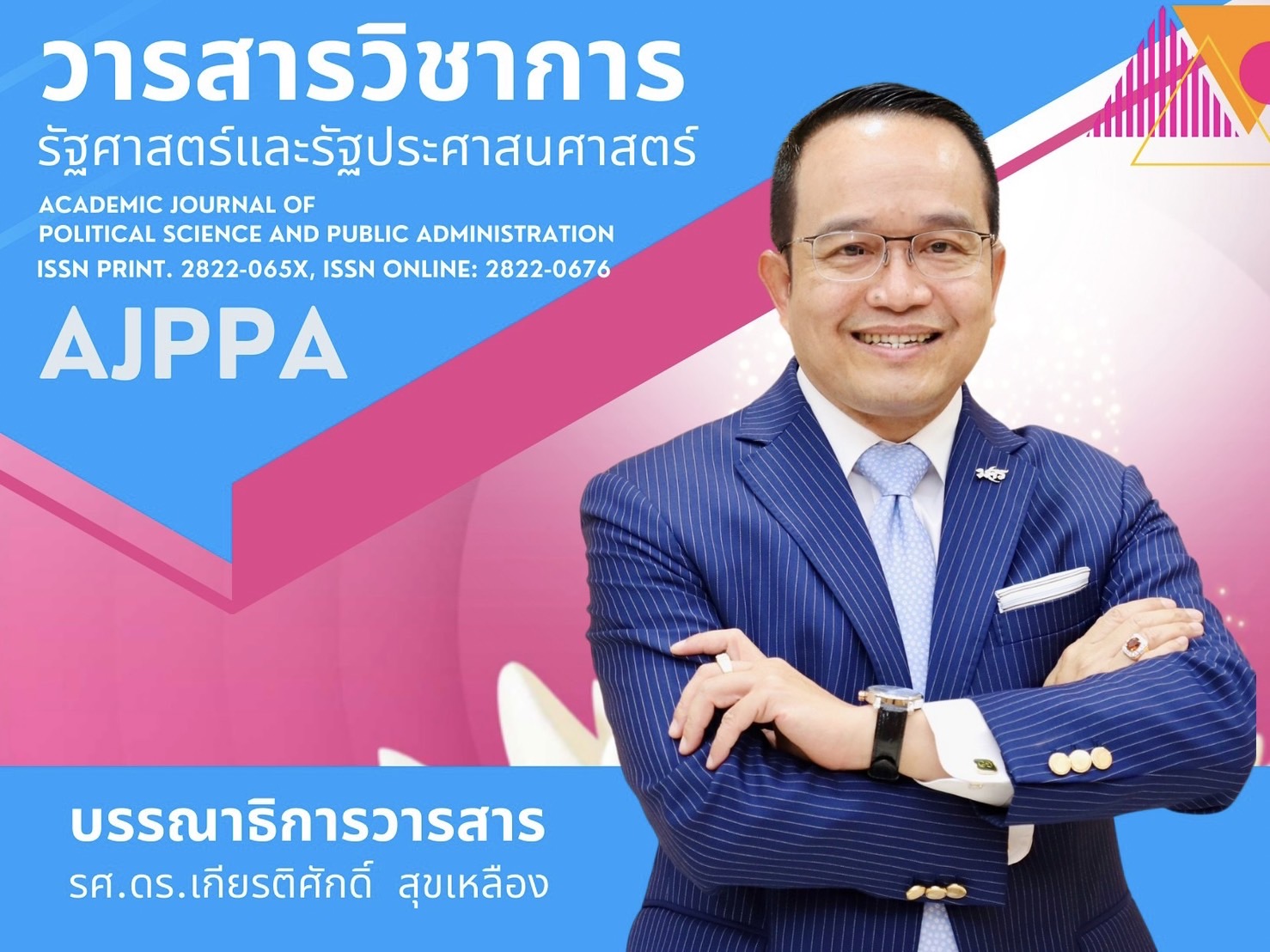พุทธวิธีสื่อสารเพื่อสร้างความนิยมทางการเมืองให้แก่ประชาชนของนักการเมืองท้องถิ่นในจังหวัดลำปาง
คำสำคัญ:
พุทธวิธีสื่อสาร, ความนิยมทางการเมือง, วจีสุจริตบทคัดย่อ
บทความวิจัยนี้มีวัตถุประสงค์ 1.ศึกษาความนิยมทางการเมืองของประชาชนต่อนักการเมืองท้องถิ่นในจังหวัดลำปาง 2. ศึกษาปัจจัยที่ส่งผลต่อความนิยมทางการเมืองของประชาชนต่อนักการเมืองท้องถิ่นในจังหวัดลำปาง และ 3. ศึกษาพุทธวิธีสื่อสารเพื่อสร้างความนิยมทางการเมืองแก่ประชาชนของนักการเมืองท้องถิ่นในจังหวัดลำปาง โดยการวิจัยแบบผสานวิธี การวิจัยเชิงคุณภาพใช้วิธีการตีความสร้างข้อสรุปและวิเคราะห์ข้อมูลจากการสัมภาษณ์เชิงลึกกับผู้ให้ข้อมูลสำคัญ จำนวน 18 รูปหรือคน และการสนทนากลุ่มเฉพาะ รูปหรือคน และการวิจัยเชิงปริมาณใช้แบบสอบถาม เก็บข้อมูลจากกลุ่มตัวอย่าง จำนวน 398 คน สถิติที่ใช้ในการวิเคราะห์ข้อมูล ได้แก่ ความถี่ ร้อยละ ค่าเฉลี่ย ส่วนเบี่ยงเบนมาตรฐาน และการวิเคราะห์การถดถอยพหุคูณ
ผลการวิจัยพบว่า 1. ความนิยมทางการเมืองของประชาชนต่อนักการเมืองท้องถิ่นในจังหวัดลำปาง ประกอบด้วย ภาพลักษณ์พรรคการเมือง ภาพลักษณ์ผู้นํา และการนําเสนอประเด็นที่เป็นแนวทางหลักของพรรคการเมือง 2. ปัจจัยที่ส่งผลต่อความนิยมทางการเมืองของประชาชนต่อนักการเมืองท้องถิ่นในจังหวัดลำปาง พบว่า การสื่อสาร และหลักวจีสุจริต ส่งผลต่อความนิยมทางการเมืองของประชาชนต่อนักการเมืองท้องถิ่นในจังหวัดลำปาง มีนัยสำคัญทางสถิติระดับ 0.01 และ 3. พุทธวิธีสื่อสารเพื่อสร้างความนิยมทางการเมืองแก่ประชาชนของนักการเมืองท้องถิ่นในจังหวัดลำปาง ด้วยหลักวจีสุจริต คือ 1. มุสาวาท การงดเว้นจากการพูดเท็จและบิดเบือน ส่งสารที่เป็นข้อเท็จจริง ข้อมูลที่ถูกต้อง ตรวจสอบสารได้ ยึดถือในหลักศีลธรรม ศีล 5 ในข้อ 4 มุสาวาท 2. ปิสุณวาจา การงดเว้นจากการพูดจาเหน็บแนมและส่อเสียดบุคคลอื่น การงดเว้นการพูดให้ผู้อื่นเสียหาย ยอมรับฟัง สนับสนุนแนวคิดและนโยบายที่มีประโยชน์แก่สังคม 3. ผรุสวาจา การงดเว้นจากการพูดคำหยาบคายให้คนอื่นเจ็บใจ ใช้คำที่สุภาพ อ่อนโยน มีสัมมาคารวะ และ 4. สัมผัปปลาปะ การงดเว้นจากการพูดจาเพ้อเจ้อ สื่อสารชัดเจนมีสาระ มีความน่าเชื่อถือ มีหลักฐานผ่านการตรวจสอบ
เอกสารอ้างอิง
ชญาน์นันท์ อัศวธรรมานนท์ และประทีป พืชทองหลาง, (2561). การสื่อสารธรรมเพื่อการพัฒนาสังคมเชิงสร้างสรรค์, วารสารสันติศึกษาปริทรรศน์ มจร, (6) (ฉบับพิเศษ), 268-283.
ชุมพล เพ็งศิริ. (2564). การส่งเสริมความเข้มแข็งการเมืองภาคประชาชนในจังหวัดนครราชสีมา (ดุษฎีนิพนธ์ปรัชญาดุษฎีบัณฑิต สาขาวิชารัฐศาสตร์). พระนครศรีอยุธยา: มหาวิทยามหาจุฬาลงกรณราชวิทยาลัย.
ชูวงศ์ ฉายะบุตร. (2539). การปกครองท้องถิ่นไทย. กรุงเทพฯ: พิฆเนศ พริ้นติ้ง เซ็นเตอร์.
ประคอง มาโต. (2564). การส่งเสริมความนิยมทางการเมืองของประชาชนมีต่อนักการเมืองในจังหวัดอุทัยธานี (ดุษฎีนิพนธ์ปรัชญาดุษฎีบัณฑิต สาขาวิชารัฐศาสตร์). พระนครศรีอยุธยา: มหาวิทยามหาจุฬาลงกรณราชวิทยาลัย.
พระชินกร สุจิตฺโต (ทองดี) . (2564). การบูรณาการหลักพุทธธรรรมเพื่อส่งเสริมการสื่อสารทางการเมืองสำหรับประชาชนจังหวัดพระนครศรีอยุธยา (ดุษฎีนิพนธ์ปรัชญาดุษฎีบัณฑิต สาขาวิชารัฐศาสตร์). พระนครศรีอยุธยา: มหาวิทยามหาจุฬาลงกรณราชวิทยาลัย.
พระนุชิต นาคเสโน (โพวิชัย). (2565). การพัฒนาการสื่อสารทางการเมืองตามแนวพระพุทธศาสนาของนักการเมืองท้องถิ่นในจังหวัดพระนครศรีอยุธยา, (ดุษฎีนิพนธ์ปรัชญาดุษฎีบัณฑิต สาขาวิชารัฐศาสตร์). พระนครศรีอยุธยา: มหาวิทยามหาจุฬาลงกรณราชวิทยาลัย.
พระมหาพิพัฒพงศ์ ฐิตธมฺโม (วงษ์ชาสี). (2564). การประยุกต์หลักพุทธธรรมเพื่อส่งเสริมการสื่อสารของนักการเมืองไทย (ดุษฎีนิพนธ์ปรัชญาดุษฎีบัณฑิต สาขาวิชารัฐศาสตร์). พระนครศรีอยุธยา: มหาวิทยามหาจุฬาลงกรณราชวิทยาลัย.
มหาจุฬาลงกรณราชวิทยาลัย. (2539). พระไตรปิฎกฉบับภาษาไทย ฉบับมหาจุฬาลงกรณราชวิทยาลัย. กรุงเทพฯ: โรงพิมพ์มหาจุฬาลงกรณราชวิทยาลัย.
สุมาลี บุญเรือง และสุรพล สุยะพรหม. (2566). การบูรณาการหลักพุทธธรรมเพื่อส่งเสริมความนิยมทางการเมืองของประชาชนที่มีต่อนักการเมืองในจังหวัดบุรีรัมย์. วารสารพุทธนวัตกรรมและการจัดการ, (6)3), 99-112.
สุมาลี บุญเรือง. (2564). การพัฒนาการตื่นตัวทางการเมืองของประชาชนในระบอบประชาธิปไตยที่มีผลต่อการเลือกตั้งทั่วไป (ดุษฎีนิพนธ์ปรัชญาดุษฎีบัณฑิต สาขาวิชารัฐศาสตร์). พระนครศรีอยุธยา: มหาวิทยามหาจุฬาลงกรณราชวิทยาลัย.
อโณทัย วัฒนาพร. (2558). นักการเมืองถิ่นจังหวัดลำปาง. กรุงเทพฯ: สถาบันพระปกเกล้า.
อเนก เหล่าธรรมทัศน์. (2549). กษิณา-ประชานิยม : ความหมาย ปัญหา ทางออก. นนทบุรี: สถาบัน พระปกเกล้า.
Lasswell, H. D. (1984). The Structure and Function of Communication in Society, The Communication of Idea. New York: Harper and Row Publishers.

ดาวน์โหลด
เผยแพร่แล้ว
รูปแบบการอ้างอิง
ฉบับ
ประเภทบทความ
หมวดหมู่
สัญญาอนุญาต
ลิขสิทธิ์ (c) 2024 วารสารวิชาการรัฐศาสตร์และรัฐประศาสนศาสตร์

อนุญาตภายใต้เงื่อนไข Creative Commons Attribution-NonCommercial-NoDerivatives 4.0 International License.




